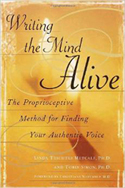Q: Can anyone do PW?
A: Anyone who can read and write on a third grade level can do PW. We have effectively taught elementary school students, home schoolers, MDs, and PhDs. The method has great simplicity. It has been compared to a Japanese garden and a mathematical formula. Its effects are profoundly deep. They can alter a person’s life in remarkable ways.
Q: How does PW differ from other process-writing methods like stream-of-consciousness writing, free writing, journal writing, writing down the bones, and morning pages?
A: PW is the only writing practice that encourages you to slow your thoughts and focus on what we call “inner hearing,” on listening to them with empathy and curiosity and reflecting on them in writing. Other process writing focuses only on expression. PW focuses on both expression and reflection.
Q: How does PW help writers, both professionals and those who want to write for publication?
A: Although you don’t learn the writer’s craft through PW, it can help writers immeasurably in other ways. It can relax you and refresh you. It can generate raw material that you can develop in your writing projects. It can inspire your imagination. It can instill confidence in your writing voice. It can unblock you. On the most basic level, it can lay down the foundation for writing discipline.
Q: How does PW promote creativity?
A: People have blocks to creativity for all kinds of reasons. These may reside in your memories (some going way back to childhood), in your emotions, and in your attitudes, values, and belief systems. By bringing these into the open through attention to your ideas and feelings, the PW method begins to break up these blocks.
Q: Is PW therapy?
A: PW is an important adjunct to the healing arts. Through PW people learn to express their thoughts without judging themselves, reflect on feelings without guilt or shame, and experience their emotions without being overwhelmed by them—the first step to emotional health. Many psychotherapists and mental health practitioners use PW in their practice.
Q: How does PW develop your spirituality?
A: Many people testify to the spiritual benefits of PW. PW practitioners frequently report feeling at peace with themselves as never before. By seeing how their own experience is part of the broader human picture, people who practice PW often feel greater connectedness to others which increases their compassion and empathy.
Q: How does PW enhance meditation?
A: Buddhists and other meditators claim that PW prepares the mind for meditation. Like meditation, PW focuses on attention. (Paradoxically, in PW you attend to your thoughts and feelings to gain the same effects as meditations that require you to let go of thoughts and feelings.) Like meditation, PW requires a regular, disciplined practice in a quiet environment, free of outer distraction.
Q: How does PW strengthen leadership qualities?
A: PW helps you to know yourself. Knowing yourself builds self-confidence, which inspires others’ confidence in you. In addition to helping you clarify your thinking, PW makes you a better listener, sensitive to other peoples’ feelings. It makes you a non-competitive listener, able to bring out the creativity in others.
Q: What are the health benefits of PW?
A: Controlled studies have shown that reflective writing which expresses emotion has positive effects on health: it lowers blood pressure, creates beta waves, produces endorphins, boosts the immune system, even reduces frequency of doctor visits.
Q: Which is the better way to begin PW, alone or with a teacher?
A: Both are good. Some people prefer to get started with a teacher (in a web course or workshop). After that they can work effectively alone or with a small, unguided group. Other people find reading the instructions in Writing the Mind Alive sufficient. They begin on their own and take a workshop or online course when they’re ready for more.
Q: Linda, how did you happen to create the PW method?
A: My mother died when I turned 7. From that time on my emotions and thoughts were disconnected. I felt like a divided person who was cut off from her inner self. Though I tried many ways to heal myself, from higher education to marriage to psychotherapy, it wasn’t until I was a college professor in my mid-thirties that almost by accident I stumbled upon my cure. I began to write daily following certain rules and after several months I found myself feeling whole for the first time in 25 years. It had such a powerful effect that I decided to introduce the method to my students.
Q: Why do you call your work “Proprioceptive Writing”?
A: The body’s proprioceptive system (discovered by Sir Charles Scott Sherrington, a neurosurgeon, in the 1890s, and described by Oliver Sacks) seemed to us a perfect physical model for our sense of how consciousness works in the mind. The body knows itself through its proprioceptive sense, and through this kind of writing the mind comes to know itself. So we called it Proprioceptive Writing, or PW.

